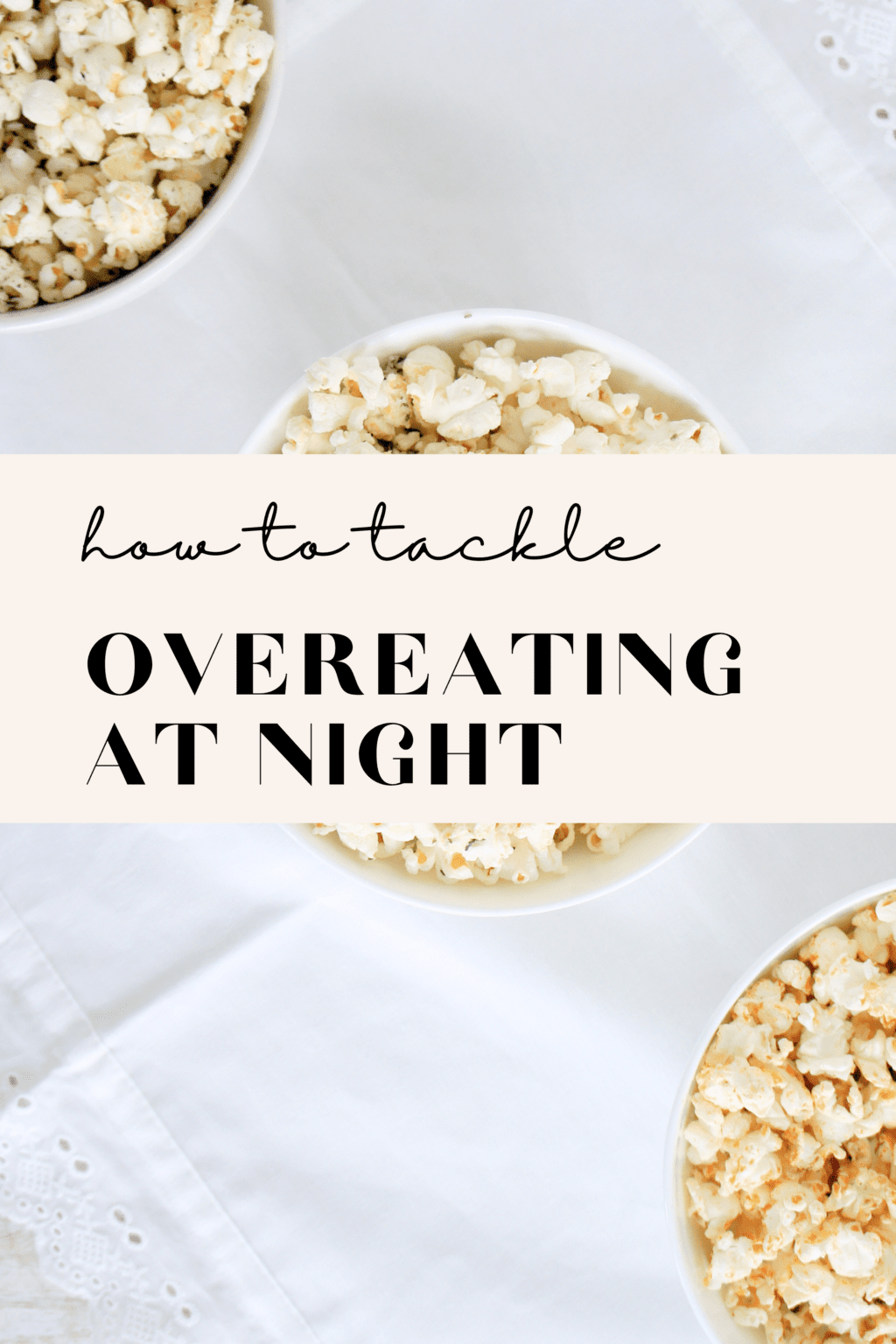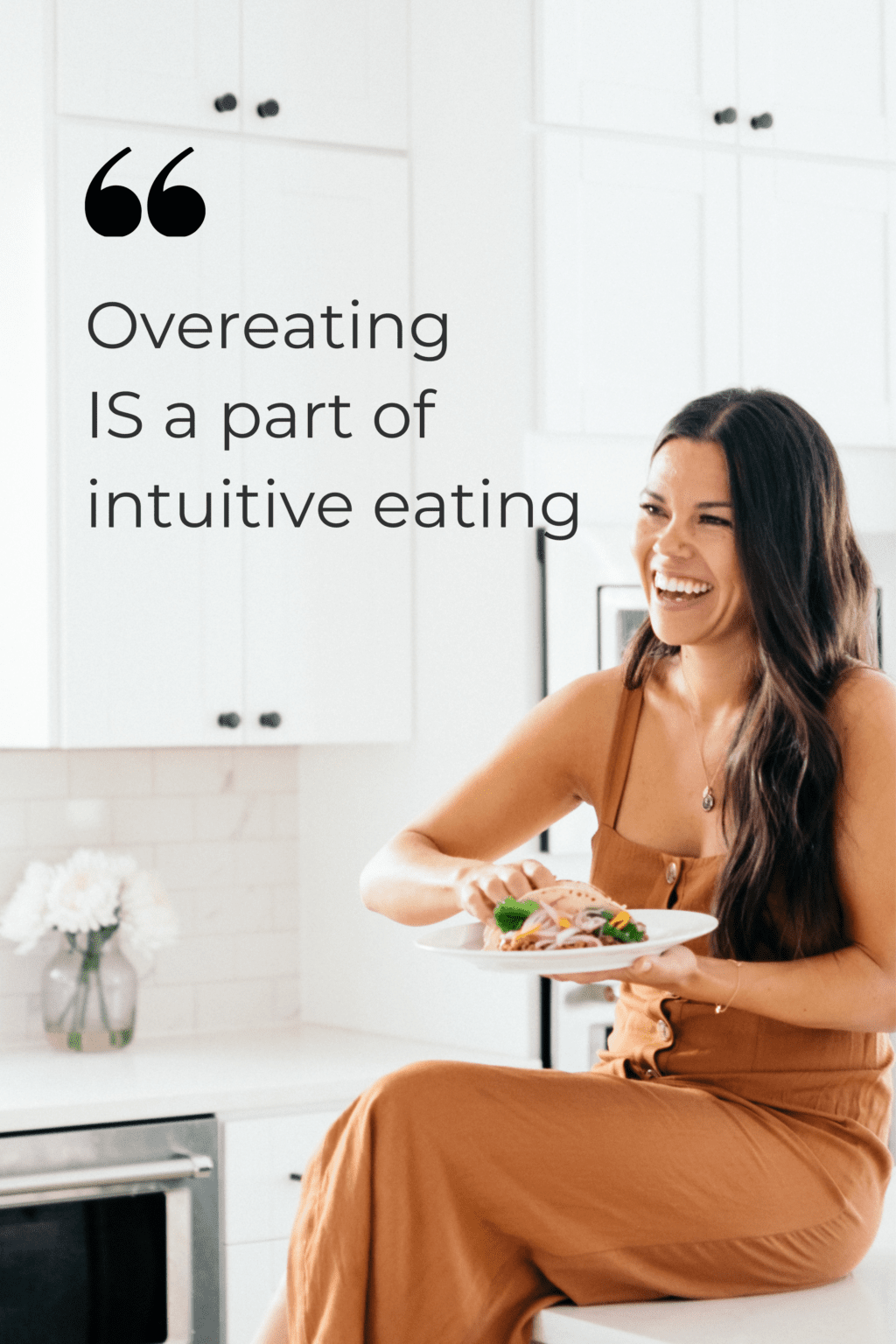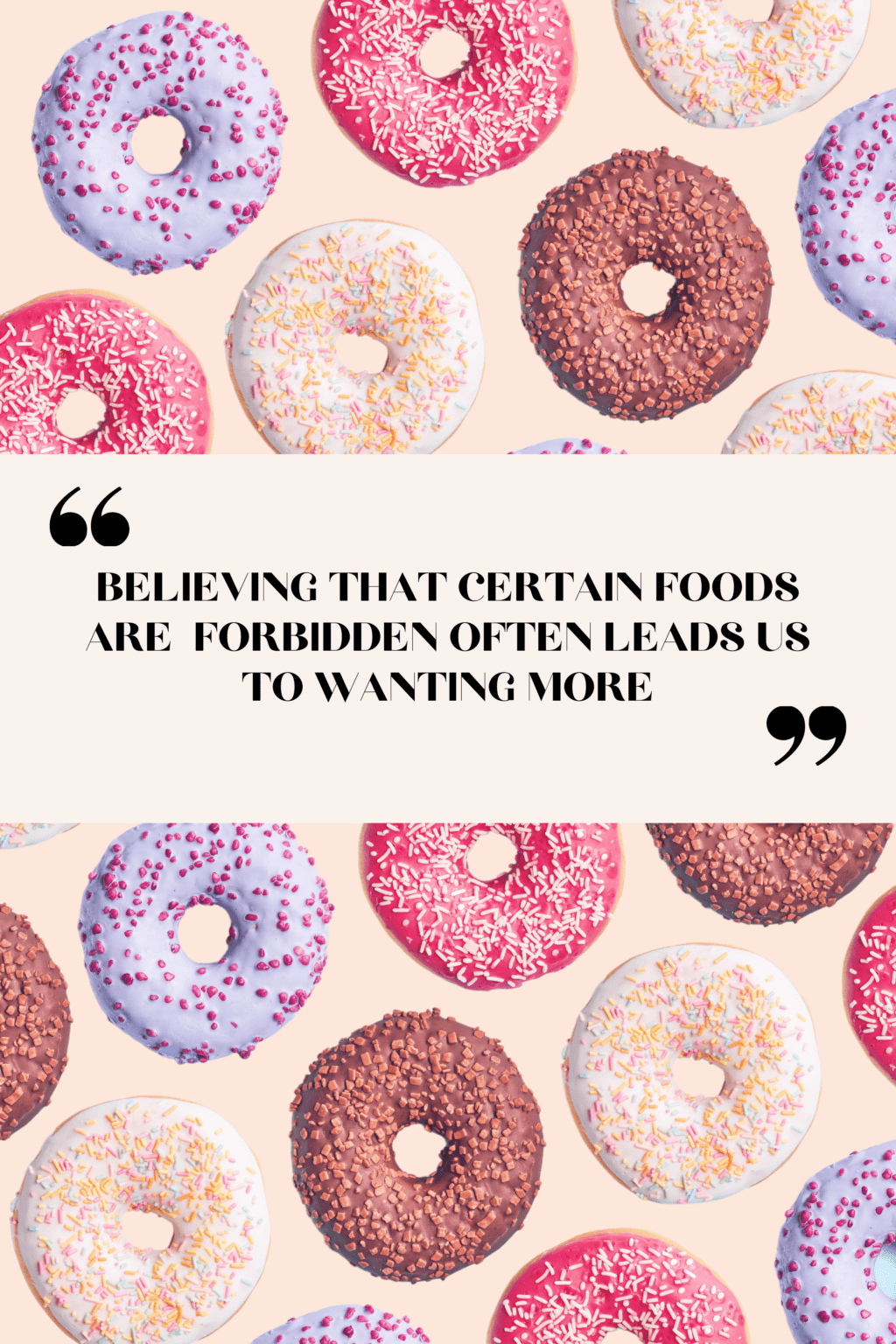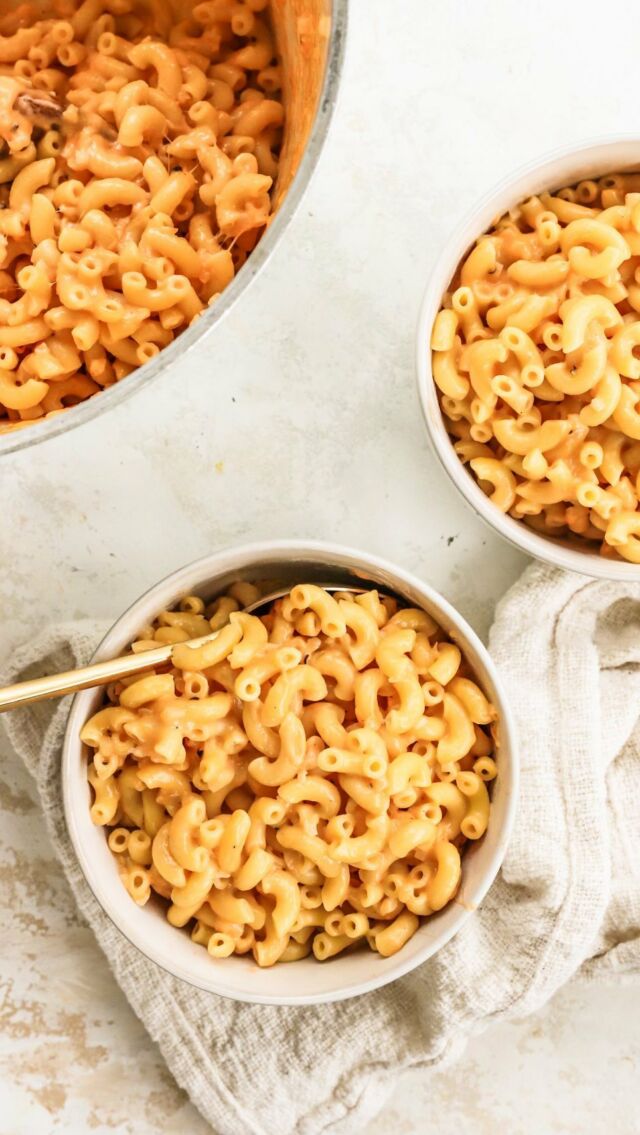Have you ever experienced overeating after a long day? If so, you’re not alone, and this is definitely not a matter of lack of willpower or discipline. Read on to learn about what overeating is (and isn’t!), what may drive overeating at night, how overeating may impact our bodies, and 3 dietitian tips to stop that out of control nighttime eating.

As intuitive eating dietitians, struggling with overeating at night is a common challenge we hear from our Make Food Feel Good Community. Thanks to diet culture, there’s a lot of shame and guilt associated with the idea that we’ve eaten “too much” and navigating these feelings can be really difficult. If you’ve ever felt this way, hear this first – you are so not alone.
So let’s dive into what overeating is (hint, it’s not something to be ashamed of!), what the difference between overeating and bingeing is, why we might overeat at night, what the impacts of overeating may be on our bodies, and 3 tips to stop overeating at night.
In this blog we will cover:
- What overeating is (and isn’t)
- What is the difference between overeating and binge eating?
- Why does overeating happen at night
- How does it affect your body
- 3 ways to tackle overeating at night – the feel good way
While overeating at times is totally normal, frequently overeating can lead to physical discomfort, bloating, and unstable blood sugars. It can also disconnect you from understanding your body’s hunger and fullness signals. Read more about it here.
Ensure you are eating adequate, balanced meals throughout the day. Tune inwards and reconnect with your hunger and fullness signals, and pull in mindfulness to help kickstart behavior change. Read more about that here.
What is overeating?
Overeating can be described as eating more food than your body needs to the point where you may feel physically uncomfortable.
The idea of eating ‘too much’ can be really distressing because of the implication that overeating will end in weight gain. This fear of weight gain stems from the diet culture that we live in that equates thinness with health and moral virtue and reinforces the idea that our worth is based on our weight and shape. As it turns out, this is simply not the case! We are so much more than a body and our lives are meant for so much more than to spend our time, energy, and money striving to be thinner. If this resonates with you, we dive more into this topic in our blog post How to Spot Diet Culture.
Overeating is not something that is wrong or something that needs to be atoned for. In fact, overeating is a natural part of being an intuitive eater. As registered dietitian and family therapist, Ellyn Satter, describes in her definition of ‘normal eating’:

“Normal eating is overeating at times, feeling stuffed and uncomfortable. And it can be under eating at times and wishing you had more. Normal eating is trusting your body to make up for your mistakes in eating.”
While we don’t actually see these as “mistakes” but opportunities to learn and gain information about ourselves and our bodies, the key message here is trusting your body to know what to do if you under or overeat.
So what is the ‘right’ amount of food for your body? A common theme we hear come up when working with our clients is the idea of basing how much food one should eat on external factors, such as what the serving size says on the label, how much your friend is eating, or how much you think is enough. While thinking about portions in this way often helps us to feel ‘in control’ and ‘on track,’ it disconnects us from our bodies and our innate hunger and fullness signals. One tool we often teach to our clients in our Make Food Feel Good Program is How to use the hunger fullness scale properly to reconnect with their bodies’ wisdom.
The bottom line: while overeating isn’t wrong or something to be ashamed of, frequently eating past pleasant fullness to the point of discomfort may be a sign of deeper issues at play.
What is the difference between overeating and binge eating?
The difference between overeating and binge eating is, simply put, whether or not you feel a loss of control. According to the Diagnostic and Statistical Manual of Mental Disorders, Fifth Edition (DSM-5), an objective binge eating episode can be characterized by both:
- Eating, in a discrete period of time (for example, within any two-hour period), an amount of food that is definitely larger than most people would eat in a similar period of time under similar circumstances
- A sense of lack of control over eating during the episode (for example, a feeling that one cannot stop eating or control what or how much one is eating)
Notably, someone may experience a subjective binge eating episode even if they eat a small to moderate amount of food in a discrete period of time, but they feel a sense of loss of control.
Alternatively, overeating can include eating past fullness to a point of discomfort while still feeling in control over one’s actions.
Ready to Transform Your Relationship with Food?
Explore not just what you eat but why you eat, how you feel when you eat and any patterns that affect how you feel or impact any choices you make and start your journey to food freedom today!
Why you overeat at night
The urge to overeat at night is often driven by mental and/or physical restriction.
Physical restriction
Physically restricting food intake, whether by skipping whole meals or by eating small portions throughout the day can lead to an overwhelming urge to eat at night. Despite what diet culture wants us to believe, this phenomenon is not a lack of willpower or discipline, but is actually due to us being biologically wired to survive. For example, in response to deprivation, increased levels of the hunger hormone ghrelin and the neurotransmitter neuropeptide Y are released, which increases our appetite and drives us to seek out and crave carbs.This is typically where the ‘caveman brain’ kicks in and you’re ripping open the cupboards and eating everything in sight.
Mental restriction
Even if you’re not physically restricting, mental restriction may be causing you to feel out of control at night. Mental restriction occurs when we believe that certain foods are ‘good’ and certain foods are ‘bad.’ When we impose moral value on foods, it’s our human nature to, in turn, place moral judgements on ourselves. If we feel that we’ve broken the rules by eating a ‘bad’ food, we’re more likely to feel intense guilt/shame, which often leads to the ‘all or nothing thinking’ or the ‘last supper mentality.’ Additionally, believing that certain foods are ‘forbidden’ often leads to us craving and wanting that food more – it’s psychology 101, humans want what we can’t have.

How does it affect your body
Chronically overeating to the point of discomfort can cause stomach pain and bloating due to over extension of the stomach as well as delayed stomach emptying. It also may lead to an overstimulation of the pancreas to release insulin (a hormone that lowers one’s blood sugar levels). In some cases, this overstimulation of the pancreas may result in a low blood sugar, often accompanied by feelings of fatigue, shakiness, and claminess.
Additionally, continuously overriding your natural fullness cues can further disconnect you from your body’s cues.
3 ways to tackle overeating at night
If you’re ready to stop feeling guilty after eating and learn how to better manage your nighttime cravings, here are 3 tips to stop out of control nighttime eating for good:
1 – First and foremost, you have to eat enough and eat often enough
This often looks like 3 well-balanced meals and snacks as needed to keep our bodies nourished and our blood sugars stable.
2 – Reconnect with your internal hunger and fullness signals
As mentioned above, if you’ve struggled with external food rules or beliefs that dictate how much you are allowed to eat, you are likely missing the mark on knowing what pleasant hunger and fullness feels like in your body. If this feels familiar to you, we recommend using a hunger and fullness scale to help learn what the varying levels and more nuanced signs of hunger and fullness feels like to you
3 – Bring in mindfulness
Mindfulness is, simply put, awareness without judgment. It’s becoming a neutral observer and noticing our eating patterns and how our eating decisions make us feel. This practice is so powerful for behaviour change because once you see it, you can’t unsee it! Our favourite way to apply mindful eating is to complete a mindful food journal for a few days to weeks to really reflect on how your eating impacts how you feel in your day to day. Through this exploration, we’re better able to understand Why am I eating? And understand the 3 types of hunger (stomach, mouth, and heart hunger).
Now over to you
- Have you ever felt out of control with food?
- What comes up for you when you hear the term ‘overeating’?
- Any other questions we may have missed?
Share with us in the comments below or take a screenshot and share it with us over on Instagram! And if you found this post helpful, pass it along to a friend or family member who could benefit from it too!
Looking for more support?
If you’re looking for guidance on where to start with healing your relationship to food, fostering trust within yourself and your body, and building confidence in your everyday eating, we’d love to support you! Book in for an initial assessment or schedule a free discovery call to get started









Leave a Comment & Rate this Recipe